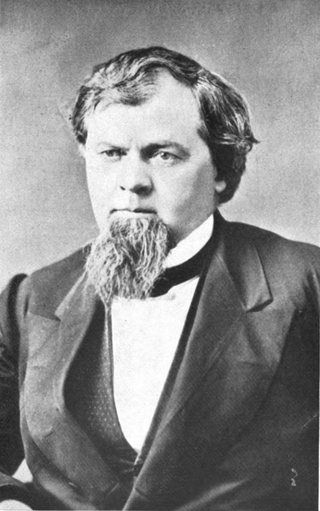
James Sproat Brown was an American lawyer and politician who became the first Attorney General of Wisconsin. He also served one term as mayor of Milwaukee, Wisconsin, and represented Wisconsin's 1st congressional district in the United States House of Representatives during the 38th Congress (1863–1865) as a member of the Democratic Party.
Herman L. Page was a merchant and Wisconsin politician. He was born in Oneida County, New York, later moving to Nunda, New York, in Livingston County, New York, in 1844.

Harlow South Orton was an American lawyer and judge. He was the 8th Chief Justice of the Wisconsin Supreme Court, and served on the court from 1878 until his death. He is chiefly remembered as the author of the Wisconsin Supreme Court opinion Vosburg v. Putney (1890), an important torts case in establishing the scope of liability from battery. Earlier in his career, he served three non-consecutive terms in the Wisconsin State Assembly, representing Madison and central Dane County.

Gysbert Van Steenwyk Sr. was a Dutch American immigrant, banker, and Republican politician from La Crosse, Wisconsin. He was the 4th Bank Comptroller of Wisconsin and served in the Wisconsin State Senate and State Assembly.

George Baldwin Smith was an American lawyer and Democratic politician. He was the 4th Attorney General of Wisconsin, and the 3rd and 16th mayor of Madison, Wisconsin.
The 4th Senate district of Wisconsin is one of 33 districts in the Wisconsin Senate. Located in southeast Wisconsin, the district is entirely contained within northern Milwaukee County. It comprises part of the north side of the city of Milwaukee, as well as the city of Glendale, the village of Shorewood, and parts of northern Wauwatosa and western Brown Deer. The 4th Senate district is one of two majority-black Senate districts in Wisconsin.

Abram Daniel Smith, often abbreviated A. D. Smith, was an American lawyer, politician, and pioneer. As a leader of the Hunters' Lodges, he was elected President of the Republic of Canada in the midst of the Canadian Rebellions of 1837–1838. Later, he became a prominent lawyer in the Wisconsin Territory, and was one of the first justices of the Wisconsin Supreme Court, where he authored a major opinion against the Fugitive Slave Act of 1850.

Edward Keogh was an Irish American immigrant, printer, Democratic politician, and pioneer settler of Milwaukee, Wisconsin. He served 17 years in the Wisconsin State Assembly between 1860 and 1895, representing Milwaukee's 3rd ward, and was the 37th speaker of the Assembly. He also served two years in the State Senate.
Joel Cook Squires was an American carpenter, miner, Wisconsin pioneer, and Democratic politician. He was elected as the 3rd Bank Comptroller of Wisconsin, and also served in the Wisconsin State Senate and Assembly, representing Grant County.
Duncan Cameron "Cam" Reed was an American steamship engineer and Democratic politician, and an early settler of Milwaukee, Wisconsin. He served two terms in the Wisconsin State Senate, representing the southern half of Milwaukee County, and was President pro tempore of the Senate for the 1851 and 1853 sessions. He also briefly served as a Union Army officer in the American Civil War.
Riley N. Messenger was an American lawyer, teacher, and Wisconsin pioneer. He served as a Democratic member of the Wisconsin Senate during the 1st Wisconsin Legislature (1848). He later served in the Wisconsin State Assembly during the 1853 session.
Michael P. Walsh was an American printer and labor union activist from Milwaukee, Wisconsin who held various local elected offices, as well as serving two terms as a member of the Wisconsin State Assembly from Milwaukee, initially as the nominee of the Milwaukee Trades Assembly, a labor federation which was also an antecedent to that state's Union Labor Party; but then was re-elected as a Democrat.

Edward Dwight Holton was an American business leader, politician, and Wisconsin pioneer. He was Milwaukee County's first elected sheriff and served one term in the Wisconsin State Assembly (1860). He was influential in the early political development of the state as a leader in Wisconsin's abolitionist and temperance movements, and as a co-founder of the Republican Party. He also had a strong influence on the economic development of the state through his involvement in the banking, railroad, and insurance businesses.
Peter Fagg was an American law enforcement officer, retail clerk, debt collector, temperance lecturer, colporteur, and politician from Milwaukee and Madison, Wisconsin, who served a single term as a member of the Wisconsin State Assembly's 2nd Milwaukee County district. He was a member of the Reform Party, a short-lived coalition of Democrats, reform and Liberal Republicans, and Grangers formed in 1873 in the U.S. state of Wisconsin, which had secured the election for two years of William Robert Taylor as Governor of Wisconsin, as well as electing a number of state legislators, but failed to thrive.
Frederick Tobias Zetteler was an American real estate developer, pioneer, and politician.
Moritz Nathan Becker was a German American immigrant, produce dealer, and politician. He self-identified as a "Progressive Democrat", then "Liberal Democrat", while serving two terms in the Wisconsin State Assembly during the 1870s.
William Wells Brown or W. W. Brown was an American merchant and pioneer settler of Milwaukee, Wisconsin. He was a member of the Wisconsin State Assembly for the 1st Wisconsin Legislature (1848).

The 1875 Wisconsin gubernatorial election was held on November 2, 1875. Republican Party candidate Harrison Ludington was elected with 50% of the vote, narrowly defeating incumbent Democratic governor William Robert Taylor.
William Shew was a farmer and businessman from Oak Creek, Wisconsin and Cordova, Illinois who served multiple terms in the Wisconsin Territory House of Representatives representing Milwaukee County, and was Speaker of the House of that body during the first (1847) session of the 5th Wisconsin Territorial Assembly, as well as holding various local government posts.
Cicero Comstock was an American businessman, Republican politician, and Wisconsin pioneer. He served two years in the Wisconsin State Senate, representing northern Milwaukee County, and was the first city comptroller of Milwaukee.








